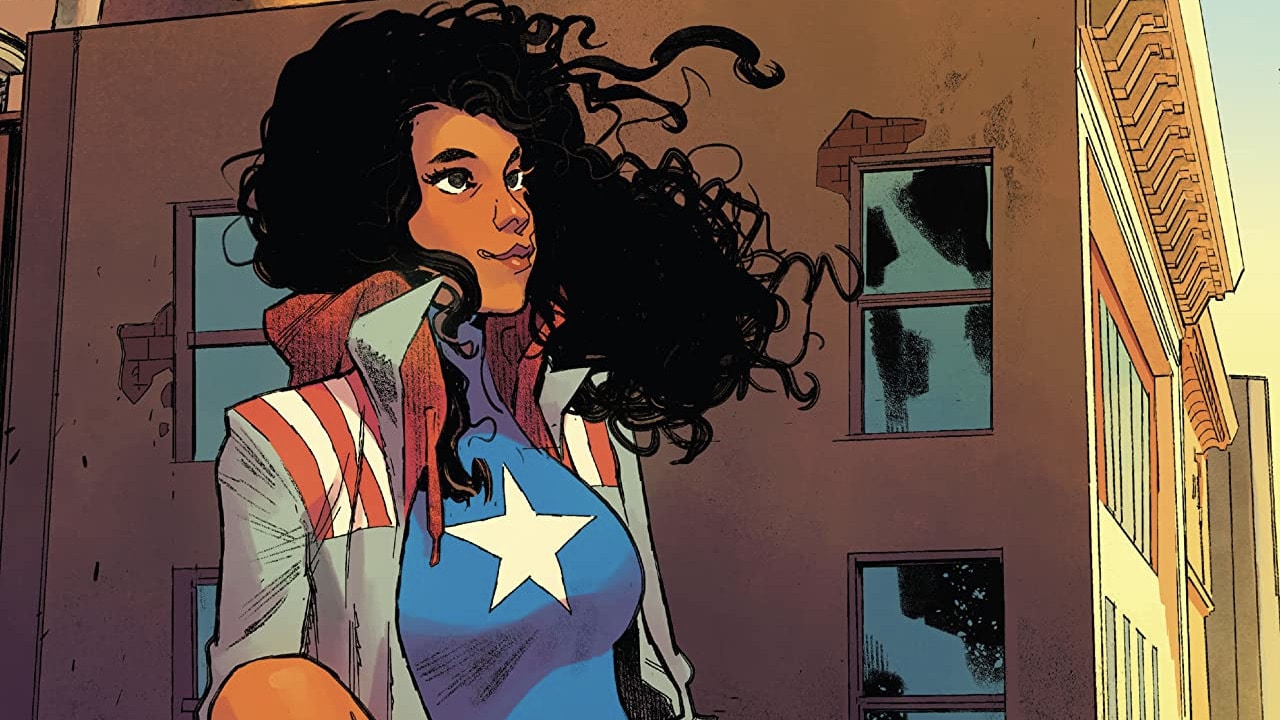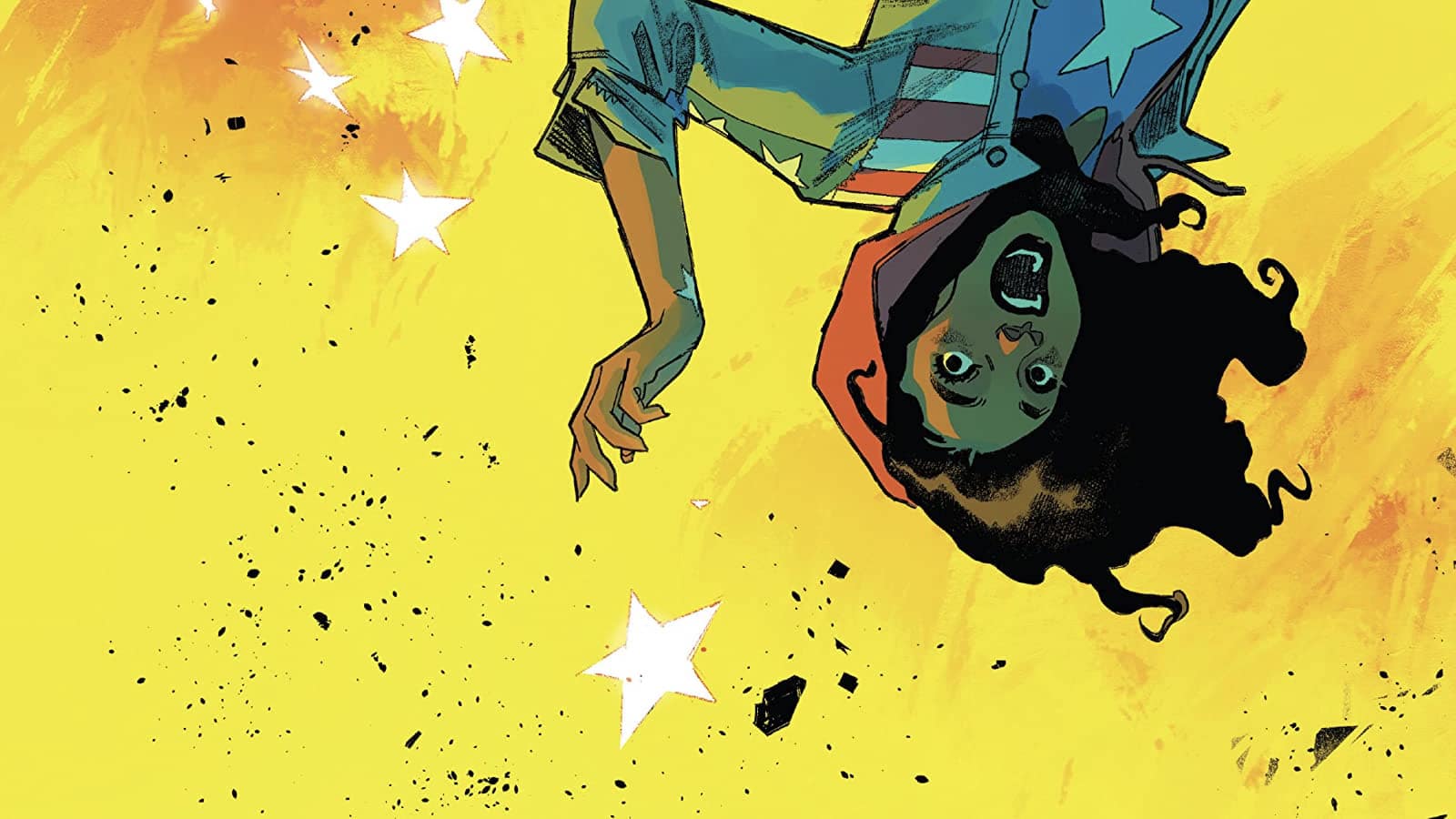America Chavez has a secret sister, who has taken her brother hostage: what do they want? What do any of us want? Are her moms really dead, or just comics-dead, or merely interdimensional? America Chavez: Made in the USA #5, written by Kalinda Vazquez, drawn by Carlos Gómez, colors by Jesus Aburtov, lettering by VC’s Travis Lanham.
So many heroes get defined by traumatic loss that America Chavez has stood out simply because her losses haven’t defined her, at least not emotionally. Both her moms died defending their– and her — supposed home, the Utopian Parallel. That’s how she and her interdimensional portal powers ended up on Earth. But she hasn’t been pining for them or nursing Big Sads. Instead she’s spent her time on Earth (and in the Young Avengers and in the West Coast Avengers) staying very focused on the present, very badass, very much able to do what needs doing, and punch very hard, with a smile. She’s also remained very visibly Puerto Rican, starting with her costume– interdimensionally Puerto Rican; she was adopted, but until this five-issue mini-series we hadn’t seen very much about her Bronx-based adoptive family, the Santanas.
That family provided the background for this series: she came home to see them, and America Chavez: Made in the USA #5 leaves her hanging with them, protecting the neighborhood for all her tíos and tías and primos. It’s good to see her amid so many Santanas, in a Latino family written by a Latina creator. It’s good to see her hanging out briefly with Spider-Man and a couple Avengers. It’s good to see her phoning her BFF (America’s term) Kate Bishop and introducing Kate to the Santanas. And it’s good to see her hanging out on a classic water-tower-rooftop with her lover from West Coast Avengers, Ramone, though apparently they’ve broken up rather than maintain a long-distance relationship: Ramone doesn’t meet the Santanas, or not on-page.
That’s not so good, and neither is the entire rest of the issue, which ties a brown heroine to newly-discovered family trauma, gives her an incurable disease, slots her into a primary role as a caregiver for young children, and mostly depowers her thanks to that disease (“Adios to dimension hopping. And flying for more than five minutes at a time.”). I’m a well-off Anglo white girl writing about a Latina heroine with a Latina writer, so maybe I ought to leave well enough alone, but it’s hard for me to leave America alone in a situation — which she accepts without question! — that befalls so many real life women of color: no more solo travel, no more starring roles in high-powered books, and apparently no time for love. It’s all familia. And child care. Except when the Avengers show up, in which case, “I don’t mind pitching in when I can.” Really?
Oh, the plot. Right. The Utopian Parallel, this mini-series reveals, wasn’t really another dimension: it was a “research facility” where America’s moms collaborated with a gazillionaire, ethically dodgy scientist in trying to cure Edges syndrome, a made-up disease that America had. The cure gave a very young America powers: she escaped, and her moms sacrificed themselves to allow it, but she left her even younger sister Catalina behind. Now a mature (or maybe teenage) Catalina has restarted the project on the island and taken America’s brother Alberto hostage, all in order to… get America to use her interdimensional powers to… bring their birth moms back from another dimension, or another plane of existence, in a way that can only take place at the research facility….inside a giant bank vault…
“Even if I could yank them out of another dimension,” America tells Catalina, “it wouldn’t be right. None of this is right.” Indeed it’s not, and it doesn’t make a whole lot of sense. I think it’s supposed to be a plot about family: Catalina insists that America owes this attempt to her birth family, just as she owes something to the Santanas. “Maybe family is disposable to you,” Catalina taunts. It’s not, but Catalina is: she vanishes into the giant star-shaped portal America– with some strain on her powers– fashions, which, of course, does not contain their moms.
Then there’s a ship full of victimized island children (“Now we find homes for you,” America tells them). And a family dinner, with reintroductions and coziness to spare. The art, even more than last issue, looks terrific: expressive, attentive to clothing and fabric and folding, enthusiastic about the characters whether they’re happy or driven by angst. The family feast is a feast for the eyes: I want the team of Gómez and Aburtov to draw America Chavez again and again. In another story. As far from this one as she can get.
Stephanie Burt is Professor of English at Harvard. Her podcast about superhero role playing games is Team-Up Moves, with Fiona Hopkins; her latest book of poems is We Are Mermaids. Her nose still hurts from that thing with the gate.



